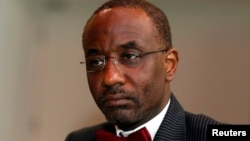ABUJA —
Nigerian President Goodluck Jonathan has suspended the governor of the central bank, who had accused the national oil company of not accounting for $20 billion of oil revenue.
Until Thursday, Lamido Sanusi was Nigeria’s Central Bank governor.
In early February he made national headlines as he spoke to lawmakers about the Nigerian National Petroleum Company, known as NNPC.
“All that we have said as Central Bank, and I think that there is no disagreement - is that NNPC shipped $67 billion worth of crude. They have repatriated or we have established that $47 billion has come back to the federation," explained Sanusi. There is $20 billion that has not come back.”
President Goodluck Jonathan announced Sanusi's suspension in a statement that accused the bank governor of “various acts of financial recklessness and misconduct."
In reaction to the news, financial markets closed and the value of the Nigerian currency, the naira, took a steep plunge.
The head of the Democracy and Legal Advocacy Center in Abuja, Clement Nwankwo, says the NNPC wields tremendous power as crude oil sales fund most of the national budget. He said Sanusi was fired for only one reason.
“Definitely because he has raised concerns about the accountability of the NNPC on oil revenues and that is really what it is,” Nwankwo stated.
Sanusi and non-government organizations have repeatedly accused the Nigerian oil industry of not accounting for huge amounts of public funds.
Abuja-based political consultant Fabian Ihekweme said Sanusi was not suspended because the accusations are untrue, but because the accusations are dangerous coming from the central bank governor, rather than a politician or an NGO.
He said it is irresponsible for any central bank governor to make allegations like these publicly, because it frightens investors and consumers, which is bad for all Nigerians.
“Any allegations he makes, any statement he makes is capable of creating panic in the stock market of that country. It is the same thing in Nigeria or any other nation. I believe what Sanusi has been doing over time, if it was not properly checked, probably could have had an adverse effect on the Nigerian economy,” said Ihekweme.
But Ihekweme said he supports new laws to make Nigeria’s oil industry more transparent.
Deputy bank governor Sarah Alade was appointed temporary bank chief, while the government investigates alleged “breaches of enabling laws, due process and mandate of the [Central Bank of Nigeria].”
Until Thursday, Lamido Sanusi was Nigeria’s Central Bank governor.
In early February he made national headlines as he spoke to lawmakers about the Nigerian National Petroleum Company, known as NNPC.
“All that we have said as Central Bank, and I think that there is no disagreement - is that NNPC shipped $67 billion worth of crude. They have repatriated or we have established that $47 billion has come back to the federation," explained Sanusi. There is $20 billion that has not come back.”
President Goodluck Jonathan announced Sanusi's suspension in a statement that accused the bank governor of “various acts of financial recklessness and misconduct."
In reaction to the news, financial markets closed and the value of the Nigerian currency, the naira, took a steep plunge.
The head of the Democracy and Legal Advocacy Center in Abuja, Clement Nwankwo, says the NNPC wields tremendous power as crude oil sales fund most of the national budget. He said Sanusi was fired for only one reason.
“Definitely because he has raised concerns about the accountability of the NNPC on oil revenues and that is really what it is,” Nwankwo stated.
Sanusi and non-government organizations have repeatedly accused the Nigerian oil industry of not accounting for huge amounts of public funds.
Abuja-based political consultant Fabian Ihekweme said Sanusi was not suspended because the accusations are untrue, but because the accusations are dangerous coming from the central bank governor, rather than a politician or an NGO.
He said it is irresponsible for any central bank governor to make allegations like these publicly, because it frightens investors and consumers, which is bad for all Nigerians.
“Any allegations he makes, any statement he makes is capable of creating panic in the stock market of that country. It is the same thing in Nigeria or any other nation. I believe what Sanusi has been doing over time, if it was not properly checked, probably could have had an adverse effect on the Nigerian economy,” said Ihekweme.
But Ihekweme said he supports new laws to make Nigeria’s oil industry more transparent.
Deputy bank governor Sarah Alade was appointed temporary bank chief, while the government investigates alleged “breaches of enabling laws, due process and mandate of the [Central Bank of Nigeria].”






